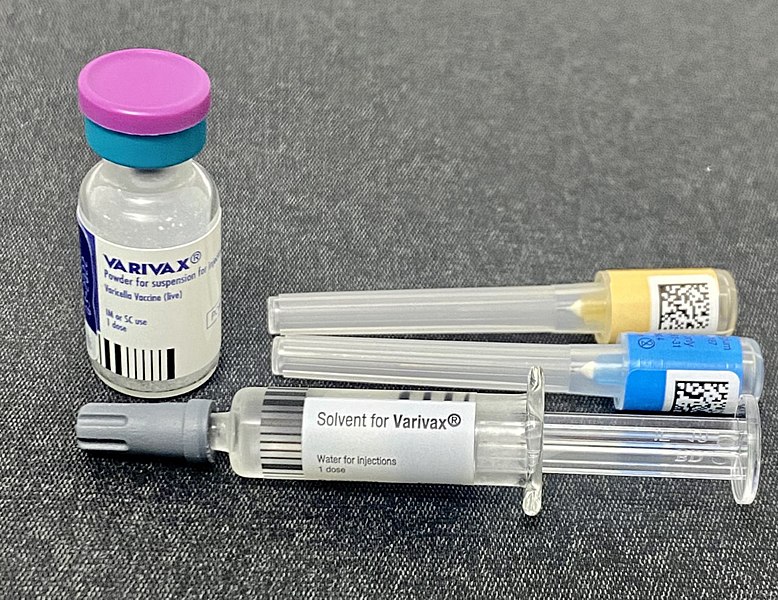Republican Legislators May Suspend Vaccine Requirements
Committee may suspend DHS rules for students on chickenpox, meningitis.

VARIVAX powder and solvent for suspension for injection (varicella vaccine: live). (CC BY-SA 4.0)
A Republican-led rules committee will consider suspending recent updates to the state Department of Health Services (DHS) immunization requirements for students in early March.
The changes implemented by DHS earlier this month include a requirement that past chickenpox infection needs to be documented by a qualified medical professional and a requirement that 12th grade students receive a second dose of the vaccine that protects against meningitis.
Mike Mikalsen, chief of staff for committee co-chair Sen. Steve Nass (R-Whitewater), told the Wisconsin Examiner that the committee will likely consider suspending the provisions as the committee previously suspended them in May 2020.
“Most of these issues we had previously deemed to be arbitrary and capricious and then imposing an undue hardship that isn’t based in statute,” Mikalsen said.
DHS first implemented updated rules in 2019, but the committee suspended them in a 6-4 party-line vote in May of 2020. The committee filed a suspension bill that was never taken up. Legislation not acted on by the end of session is dead, which allowed DHS to reimplement the rules this year.
One provision deals with students’ vaccination against varicella, or chickenpox. In Wisconsin, students are required to be vaccinated against the chickenpox virus, but one can be exempt if there’s a reliable history of previously having the chickenpox.
The new rule requires that a student’s history with the disease must be documented by a physician, physician assistant or an advanced practice nurse. The previous rule allowed parents or adult students to report a history of the disease as an acceptable exception to vaccination.
Mikalsen said the committee originally suspended the rule in 2020 because it posed an “undue burden” on parents, who he says might not have gone to the doctor if their child had the chickenpox.
“There are still a lot of parents that do it that way. Your son or daughter gets chickenpox, the parents deal with it,” Mikalsen said. “The problem for doctors, if they have not seen the patient, they can’t just go off the parents word and sign off. There would have to be a documented reliable history is what the new language requires. That’s an undue hardship.”
Ryan Westergaard, chief medical officer for the DHS Bureau of Communicable Diseases, said during a press call earlier this month that the decision to require documentation by medical professionals came down to how widespread chickenpox vaccines have become and how the disease has become rare.
“Thirty, forty years ago it was considered a rite of passage. Most children were infected and it’s highly contagious, so most people knew what chickenpox looked like,” Westergaard said. “These days it’s infrequent because of vaccination. Many providers who are in training today need to learn how to recognize chicken pox because the general population isn’t as familiar. Because it’s more rare, it’s more difficult to diagnose, there’s not as much familiarity. We want to make sure that we have the most information to have the safest policy possible.”
The department also initially recommended the rule in 2020 because studies showed many unvaccinated children who reported a positive history of chickenpox were not immune.
According to a DHS release at the time the rule change was announced, child care centers needed to begin working with parents to ensure children have proper chickenpox vaccine documentation, while schools would begin to implement changes in the 2023-2024 school year.
Another provision that the committee will likely consider suspending, according to Mikalsen, deals with student vaccination against meningococcal disease, a rare, serious illness caused by bacteria that can cause meningitis.
Students between ages 11 and 12 are required to get a first dose of the meningococcal vaccine. DHS updated the rule to require 12th grade students to get a booster dose.
“Many children have been getting this vaccine and it won’t be a big burden on many,” said Stephanie Schauer, Wisconsin immunization program manager, at the earlier DHS news conference. “It’s not a new vaccine. [The second shot is] something that’s been a part of the recommendations for a while, so it made sense to start and put that into place at this time.”
Mikalsen said the committee blocked that change in 2020 because lawmakers decided the health department had overstepped its bounds. “The second dose, while it was added to the list of recommendations that families should consider, the CDC wasn’t suggesting that it should be mandated, and unfortunately, our DHS decided to make it a mandated second dose,” he said.
The Joint Committee on the Review of Administrative Rules will hear public testimony about suspending portions of the rule at a March 7 hearing. Mikalsen said the committee could also consider other portions of the DHS’s rules on immunization of students, depending on what testimony is brought during the hearing.
Legislative committee to consider suspending new DHS vaccine rules for students was originally published by the Wisconsin Examiner.





















